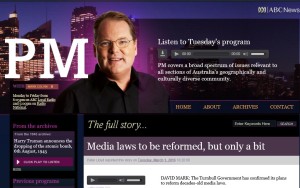 http://www.abc.net.au/pm/content/2016/s4416445.htm
http://www.abc.net.au/pm/content/2016/s4416445.htm
DAVID MARK: The Turnbull Government has confirmed its plans to reform decades-old media laws.
The major change will result in the abolition of the two-out-of-three rule, which prevented media companies from controlling a newspaper, TV and radio station in the same market.
The new laws will also allow mergers between regional television networks and their metropolitan affiliates, which is expected to unleash a wave acquisitions.
The Government says the changes will benefit people living outside major cities.
But one veteran media analyst reckons the reverse is more likely, and he’s condemned the changes.
Peter Lloyd reports.
PETER LLOYD: It’s been a generation since a government tackled the potential political bombshell called media law.
When he was PM, Tony Abbott flicked it to then communications minister Malcolm Turnbull. When he became Prime Minister, Mr Turnbull dispatched the challenge to his Communications Minister, Senator Mitch Fifield.
He reckons…
MITCH FIFIELD: It’s good news for consumers in regional areas.
PETER LLOYD: The package lifts the ban on media companies controlling a newspaper, TV and radio license in the same market.
It’s the so called two-out-of-three rule.
And, TV networks will now be allowed to broadcast to more than 75 per cent of the population.
When the predicted ownership shake-up happens, media operators in regional Australia will have to produce more local content.
National Party MPs demanded that caveat.
Current regional media players WIN, Prime Media and Southern Cross hired former deputy PM and Nationals leader Tim Fischer to spearhead their lobbying.
(Sounds from advertising campaign)
PRESENTER: Unless government policy changes soon, we might lose our voice altogether.
PETER LLOYD: Under the new rules the system for measuring local content will be more demanding. That will happen after takeovers or, what the Minister Mitch Fifield calls here, a trigger event.
MITCH FIFIELD: At the moment regional providers in the aggregated areas need to provide those 720 points of local content over a six-week period. After a trigger event, or six months after a trigger event, we will be requiring 900 points of local content over a six-week period.
PETER LLOYD: The Government’s claiming this is a win for people living outside of metro areas. Independent media economist Peter Cox has run media businesses, and he doesn’t think so.
PETER COX: What all this about is a power struggle between the media barons in Australia. I think the public interest is just a marginal area that perhaps the country party is trying to do something about.
PETER LLOYD: The Government’s saying that there’ll be more demands on the people who broadcast and who publish in the regions to produce local content. Isn’t that better?
PETER COX: Well it would be if that became practical, but my experience is right from when we went back to TV aggregation where we moved from one station on a market to three stations in the regional markets throughout Australia, and yet what did we do? We lost our local media in that process.
PETER LLOYD: Are you suggesting they’ll be attempting to fudge those figures?
PETER COX: Absolutely, because you know what? It’s a small part of the deal. This is really a deal about power, about making money, about vested interest.
The internet is starting to take money away. We’re now starting to get what we call “OTT operators”, over the top, like Netflix coming into Australia.
And I think what the regional proprietors want to do is to force the hand of the city ones to have to buy them and so they can cash out. It is totally about managing decline.
PETER LLOYD: The Media, Entertainment and Arts Alliance represents media workers. It’s given qualified support for mergers, but remains sceptical about how much any one operator should dominate in a single market. CEO Paul Murphy.
PAUL MURPHY: Our concern is to see an environment that promotes the widest possible diversity – that makes it as easy as possible for the widest number of players to deliver news and perspectives to the Australian population.
PETER LLOYD: The unhappiest mogul of all, it seems, is Rupert Murdoch.
The owner of News Corporation, which runs The Australian and pay TV provider Foxtel wanted the Government to soften the rules on which major sport events must be shown on free-to-air TV.
In an election year, it’s an undecided policy that keeps News needing to court the Government’s favour.
For Malcolm Turnbull, it’s been a challenged relationship ever since that quip at the launch of The Saturday Paper two years ago.
MALCOLM TURNBULL: You’re not some, you know, demented plutocrat pouring more and more money into a loss-making venture that’s just going to pedal your opinions.
PETER LLOYD: Media analyst Peter Cox believes personal, as well as political factors, weigh on what happens next.
PETER COX: He denied it afterwards but it was highly unfortunate. I think that probably Rupert took offence to that.
And then of course, you know, the News Limited backed Abbott of course strongly during his leadership. The one thing out of this that News Limited would like is that they’d like more access to sports programming.
And it would look as though Malcolm is holding out.
PETER LLOYD: Media law. A bit now and perhaps, a bit more after the election.
DAVID MARK: Peter Lloyd

